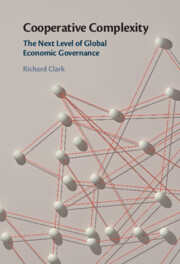
- Publisher:
- Cambridge University Press
- Online publication date:
- February 2025
- Print publication year:
- 2025
- Online ISBN:
- 9781009563840

Over the course of the twentieth century, states engaged in cooperation through international organizations at unprecedented levels. However, the twenty-first century has featured the emergence of next-level forms of cooperation: international organizations working together. This pattern is especially apparent among economic international organizations, which often pool resources and expertise to jointly implement programs in member state territories. Cooperative Complexity argues that such cooperation is politically efficient but not necessarily economically efficient; it helps geopolitically aligned organizations enforce their preferred policies but can drive inefficient economic outcomes. Combining a general theoretical model with quantitative, qualitative, and experimental research designs, this book disentangles the complex ties that connect international organizations. In doing so, it reveals how a deeper understanding of the supply side of international finance is critical for gaining insights about the form, effectiveness, and likely future of global economic governance.
‘Contemporary global governance includes myriad international institutions. Clark demonstrates that far from being at competitive loggerheads, these institutions often cooperate with each other via the mechanism of co-financing. This book draws on an impressive array of evidence, including original data compiled from international institutions' materials and new experiments.'
Sarah Bush - Associate Professor of Political Science, University of Pennsylvania
‘Cooperative Complexity is an important addition to the vibrant literature on how international organizations interact. Moving beyond the examination of IOs in isolation, Ricky Clark shows how international financial institutions not only compete but sometimes pool resources to cooperate for geopolitical reasons. The result is not always economically efficient, or universally beneficial, but it is politically efficient for the largest members of the IFIs. The implications are broadly important for both IR scholars and policymakers.’
Duncan Snidal - Professor of International Relations and fellow, Nuffield College, Oxford
 Loading metrics...
Loading metrics...
* Views captured on Cambridge Core between #date#. This data will be updated every 24 hours.
Usage data cannot currently be displayed.